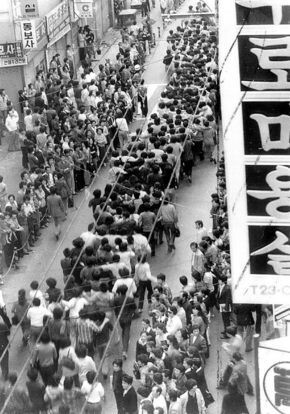hankyoreh
Links to other country sites 다른 나라 사이트 링크
Under dictatorship, some judges refused to yield

A number of former and incumbent high-ranking judges who handed down guilty verdicts to those who violated then-dictator Park Chung-hee’s so-called Emergency Measures in the 1970s said that they were merely ‘following the law.’ However, it was confirmed that other judges during that period took a different approach to the draconian measures, finding defendants not guilty and subesquently resigning from office or facing disadvantage regarding job promotion.
The Emergency Measures (or Emergency Decrees), made in the name of national security and civil order, placed restrictions on the fundamental rights of citizens, including assembly, association, and freedoms of speech and the press. They were especially aimed at quashing any dissent directed toward the Park Chung-hee government.
According to a report obtained by the Hankyoreh, lawyer Lee Yeong-gu, 74, was the chief presiding judge in charge of criminal cases at the Yeongdeungpo Branch of the Seoul District Court in 1976. At that time, Lee dealt with a case involving a female high school teacher indicted for violating one of the Emergency Measures as well as an anti-communism law. During class, she had criticized the government with remarks such as, "The North got a subway system a year earlier than the South" and "Park Chung-hee is so fixed on trying to keep his presidency permanently."
Lee, however, found the teacher not guilty, saying she had merely expressed the disgust that people felt about a prolonged one-man rule. Regarding such a decision, Lee said that he and his associate judges reached the conclusion after a long consultation.
Jo Hong-eun, a lawyer that took part in the judgment, said, "When Lee showed the draft of the ruling to another judge a day before the sentencing, that judge said, ‘How did you dare to write such a judgement? You could run into problems with such a ruling.’ " According to Jo, "That ruling is known as one of the most noted decisions in the history of Korea’s judiciary."
But the judgement had side effects for Lee. Later that same year, he was suddenly transferred to the Jeonju Distirct Court, a much smaller and less powerful venue. He resigned a month later. "Judges who gave such verdicts should risk serious dangers in those days," Jo said. "But the presiding judge made a brave decision, all under political oppression."
Lawyer Yang Yeong-tae, 67, a former judge at the Gwangju High Court, found an alleged violator of the Emergency Measures innocent in 1975. In the case, a farmer identified as Kim was accused of making remarks advocating communism and criticizing then-president Park Chung-hee for taking power by force. At the first trial, the justice handed down a guilty verdict, but Yang acquitted the defendent in a court of appeals.
"I judged according to my convictions," Yang said. When forced to rule against defendents, he said, "I only gave a maximum three-year jail term against cases of violating the Emergency Measures, but now I regret passing those rulings."
However, his acquittals took their professional toll on the judge, as he suffered disadvantages when it came to job promotion. Officials from the presidential office reportedly investigated me, said Yang. He put an end to his career as a judge in Gwangju in 1984.
"I gave so many ‘not guilty’ rulings that people gave me the nickname of the ‘not guilty judge.’ "
Please direct questions or comments to [englishhani@hani.co.kr]
Editorial・opinion
![[Guest essay] The real reason Korea’s new right wants to dub Rhee a founding father [Guest essay] The real reason Korea’s new right wants to dub Rhee a founding father](https://flexible.img.hani.co.kr/flexible/normal/500/300/imgdb/original/2024/0423/8317138574257878.jpg) [Guest essay] The real reason Korea’s new right wants to dub Rhee a founding father
[Guest essay] The real reason Korea’s new right wants to dub Rhee a founding father![[Column] ‘Choson’: Is it time we start referring to N. Korea in its own terms? [Column] ‘Choson’: Is it time we start referring to N. Korea in its own terms?](https://flexible.img.hani.co.kr/flexible/normal/500/300/imgdb/original/2024/0423/3617138579390322.jpg) [Column] ‘Choson’: Is it time we start referring to N. Korea in its own terms?
[Column] ‘Choson’: Is it time we start referring to N. Korea in its own terms?- [Editorial] Japan’s rewriting of history with Korea has gone too far
- [Column] The president’s questionable capacity for dialogue
- [Column] Are chaebol firms just pizza pies for families to divvy up as they please?
- [Column] Has Korea, too, crossed the Rubicon on China?
- [Correspondent’s column] In Japan’s alliance with US, echoes of its past alliances with UK
- [Editorial] Does Yoon think the Korean public is wrong?
- [Editorial] As it bolsters its alliance with US, Japan must be accountable for past
- [Guest essay] Amending the Constitution is Yoon’s key to leaving office in public’s good graces
Most viewed articles
- 1[Guest essay] The real reason Korea’s new right wants to dub Rhee a founding father
- 2Terry Anderson, AP reporter who informed world of massacre in Gwangju, dies at 76
- 3[Column] ‘Choson’: Is it time we start referring to N. Korea in its own terms?
- 4Why Korea shouldn’t welcome Japan’s newly beefed up defense cooperation with US
- 5[Column] The clock is ticking for Korea’s first lady
- 6[Editorial] Japan’s rewriting of history with Korea has gone too far
- 7Opposition calls Yoon’s chief of staff appointment a ‘slap in the face’
- 8Video evidence surfaces showing Korean comfort women were massacred by Japanese military
- 9Senior doctors cut hours, prepare to resign as government refuses to scrap medical reform plan
- 10New AI-based translation tools make their way into everyday life in Korea